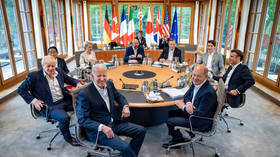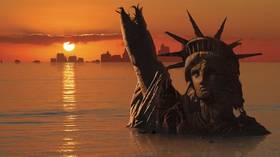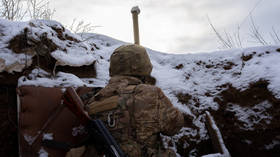Sergey Karaganov: We are witnessing the birth of a new world order where West will have to live within its means
It’s time for the Global Majority to take their rightful place at the top table

At last week’s Valdai Forum, in Moscow I was invited to speak at a session entitled “The Crumbling World: Lessons for the Future from the Political-Military Crisis of 2022.” The event has become a leader in the international intellectual community in dealing with global affairs of the present and future. But the title of the session gave me doubts, even if I didn’t protest.
The crisis did not start in 2022, it started in the mid-1990s – just as the Second World War really began with the post-First World War Treaty of Versailles, which was unfair and laid the foundations for what later transpired.
Almost three decades ago, the West refused to strike a just arrangement with post-Soviet Russia. Instead, as it seemed to many at the time, it created a new domination system based on so-called “rules.”
Others later referred to it more accurately as global liberal imperialism. But it was built on sand. It contained a World War III landmine that would sooner or later explode. Veterans like me tend to store memories, often misremembered, but I have been on the record since 1996-1997 that a world based on NATO expansion and Western domination would lead to war.
US-led hegemony began to crumble in 1999 when, in a daze of impunity, the bloc violated Yugoslavia. The crumbling went further when, in euphoria, it went into Afghanistan, then into Iraq and lost, devaluing its then military superiority and moral leadership. At the same time two even more important processes were taking place. Russia became convinced – after Yugoslavia, Afghanistan, Iraq and the US withdrawal from the ABM Treaty – that it was impossible to build a just and lasting peace with the West, and began to restore its military might.
Thus, once again, as Moscow had done in the past, it began to kick at the foundations of Western domination in the global economic, political and cultural spheres, which was based on military superiority. This dominance lasted for 500 years and began to crumble in the 1960s. In the 1990s, because of the fall of the USSR, it seemed to have returned, but now Moscow has started to shake its foundations again.
At the same time, the West missed the rise of China. In parallel, an even more surprising mistake was made. In the late 2000s, it began to restrain both China and Russia simultaneously, pushing them towards a single political-military bloc that combined their core interests.
A manifestation of this was the 2008 economic crisis, which took place against the backdrop of the aforementioned processes and undermined confidence in the West's moral, economic and intellectual leadership.
Since the late 2000s the West has been creating the conditions for a Cold War. But there was still a window of opportunity to agree with Russia and China on the terms of the new world. It existed somewhere between 2008 and 2013. But it wasn’t used. Since 2014, the US-led bloc has intensified its active policy of containment of China and Russia, including promoting a coup d'état in Kiev to prepare proxies to try and undermine Moscow.
The West – losing military, political and moral ground and even its moral core (look at Western Europe’s move away from Christianity) – went on a hysterical counterattack. War was becoming inevitable, the question was where and when.
Covid was used as a substitute for two years. But once its effect had been diluted, a clash here or there became inevitable. Realizing this, Russia decided to strike first.
This operation had several aims: to prevent the West from creating a military offensive bridgehead on Russia's borders, which was rapidly taking shape, and to prepare the country for the long-term effects of conflict and rapid change. This requires a different model of society and economy – one of mobilisation.
The next goal is to purge the elites of pro-Western and “comprador” elements.
But perhaps the main thrust of the offensive from the perspective of world history, not just Russian history, is the struggle for the final liberation of the planet from the 500-year-old Western yoke, which has suppressed countries and civilizations and imposed unequal terms of engagement on them. First by simply plundering them, through colonialism, then neocolonialism, and later through the globalist imperialism of the last 30 years.
The conflict in Ukraine, like many events of the last decade, is not only about shattering the old world, it is also about creating a new, freer, fairer, more politically and culturally pluralistic and multi-colored world.
The global meaning of the fight in Ukraine is the return of freedom, dignity and autonomy to the non-West (and we propose to call it by another name – the Global Majority, which was previously suppressed, robbed and culturally humiliated). And, of course, a fair share of the world's wealth.
Russia cannot fail to win this war, although it will be difficult. Many of us had not counted on such a strong willingness on the part of the West to fight militarily, and on such a determination from some Ukrainians – who had been transformed into the likeness of the German Nazis previously set against Moscow – to fight desperately, and at their level of armaments. Probably, given the general global trends and the global balance of power, we should have struck earlier. But I don't know the level of readiness of our Armed Forces.
I think that in 2014 we definitely should have acted more decisively, abandoning hopes of an agreement.
We are living in a dangerous period, on the brink of a full-fledged third world war that could end humanity's existence. But if Russia wins, which is more than likely, and the hostilities do not escalate into a full-blown nuclear conflict, we should not look at the coming decades as a time of dangerous chaos (as most in the West are saying). We have been living in this period for a long time.
It will be, if we choose a world of constructive creation and the attainment of freedom, justice and dignity by peoples and nations.
The old system of institutions and regimes has already collapsed (freedom of trade and respect for private property). Meanwhile, institutions like the WTO, the World Bank the IMF, the OSCE and the EU are, I am afraid, reaching their last years.
New bodies are beginning to emerge to which the future belongs. They are the SCO, ASEAN+, the Organisation of African Unity and the Regional Comprehensive Economic Partnership (RCEP). The Asian Development Bank is already lending many times more than the World Bank. Not all new institutions will survive, and let us hope that a number of them will survive, especially in the UN system, which urgently needs reform to primarily represent the Global Majority in the secretariat, rather than the West.
The main thing is to prevent a losing West from stalling history or derailing it through a world war.
Not only Global Majority countries, but Western countries can live quite happily in this world. The West will simply lose the opportunity to plunder the rest of the planet and it will have to shrink a bit. They will have to live within their means.
I am afraid that this new world taking shape now will be created beyond my intellectual or physical life. But my young colleagues and certainly their children will see it.
But this beautiful vision has to be fought for, first of all by preventing a third world war, because of the attempted revenge of the West. Again, it was in Europe that the first two world wars were unleashed. Russia is now fighting, among other things, to ensure that the prerequisites for a third are not ripe. But conflicts will occur in an era of rapid change. So the struggle for peace should be one of the main themes of our intellectual community and the world at large.
https://www.rt.com/russia/565676-karaganov-new-world-order/




0 Comments:
Post a Comment
Subscribe to Post Comments [Atom]
<< Home